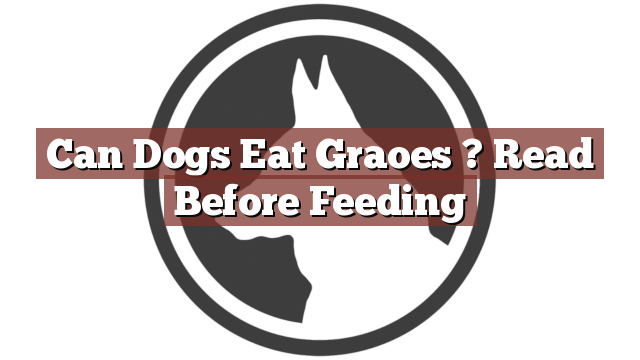Understanding Your Dog’s Dietary Needs
As a responsible pet owner, it is essential to understand your dog’s dietary needs to ensure their overall health and well-being. Dogs have specific nutritional requirements that differ from humans, and certain foods that are safe for us can be harmful or even toxic to them. It is crucial to be aware of what foods are safe for your furry friend and which ones should be avoided.
Can Dogs Eat Grapes? Read Before Feeding
Can dogs eat grapes? This is a question that often arises among dog owners. Unfortunately, the answer is no. Grapes, along with raisins, are highly toxic to dogs and can lead to severe health complications. Even small amounts of grapes can cause kidney failure in dogs, which can be life-threatening. It is crucial to remember that the toxicity of grapes applies to all breeds and sizes of dogs, so no dog should consume them.
Pros and Cons of Feeding Grapes to Dogs
When considering whether to feed grapes to your dog, it is essential to weigh the pros and cons. While grapes may be a tasty and healthy snack for humans, they can have detrimental effects on a dog’s health. Some of the potential consequences of grape consumption in dogs include kidney failure, vomiting, diarrhea, lethargy, and even death. The toxic substance in grapes that affects dogs is still unidentified, making it impossible to predict the severity of the reaction in each individual dog.
On the other hand, there are no significant benefits to feeding grapes to dogs. Dogs have different nutritional needs, and their diet should primarily consist of high-quality dog food that is specifically formulated to meet those needs. There are plenty of safe and nutritious treats available that are specifically made for dogs, ensuring they receive the necessary nutrients without risking their health.
Conclusion: Exercise Caution When Considering Grape Consumption for Dogs
In conclusion, it is crucial to exercise caution and refrain from feeding grapes to your dog. The potential health risks associated with grape consumption in dogs far outweigh any potential benefits. Even a small quantity of grapes can lead to severe kidney damage and other complications, which can be fatal. As a responsible pet owner, it is important to prioritize your dog’s health and well-being by providing them with a balanced and appropriate diet. If you have any doubts or concerns about what foods are safe for your dog, it is always best to consult with a veterinarian who can provide you with professional advice tailored to your dog’s specific needs.
Thank you for taking the time to read through our exploration of [page_title]. As every dog lover knows, our furry friends have unique dietary needs and responses, often varying from one canine to another. This is why it's paramount to approach any changes in their diet with caution and knowledge.
Before introducing any new treats or making alterations to your dog's diet based on our insights, it's crucial to consult with a veterinarian about [page_title]. Their expertise ensures that the choices you make are well-suited to your particular pet's health and well-being.
Even seemingly harmless foods can sometimes lead to allergic reactions or digestive issues, which is why monitoring your dog after introducing any new food item is essential.
The content provided here on [page_title] is crafted with care, thorough research, and a genuine love for dogs. Nevertheless, it serves as a general guideline and should not be considered a substitute for professional veterinary advice.
Always prioritize the expert insights of your veterinarian, and remember that the health and happiness of your furry companion come first.
May your journey with your pet continue to be filled with joy, love, and safe culinary adventures. Happy reading, and even happier snacking for your canine friend!

